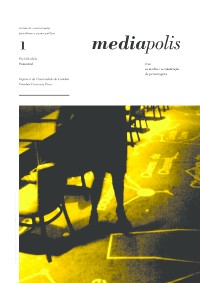Please use this identifier to cite or link to this item:
https://hdl.handle.net/10316.2/36941| Title: | A cidade e as suas personagens em fim de século: quadro de emergência de uma cultura urbana de massas em Portugal | Other Titles: | The city and its characters in the end of the 19th century: Framing the emergence of the urban mass culture in Portugal | Authors: | Peixinho, Ana Teresa Dias, Luís Augusto Costa |
Keywords: | City;mass culture;urban characters;press;Cidade;cultura de massas;personagens urbanas;imprensa | Issue Date: | 2015 | Publisher: | Imprensa da Universidade de Coimbra | Abstract: | Este artigo corresponde a uma etapa de um projeto de investigação mais amplo que pretende estudar a emergência da cultura de massas em Portugal no contexto da modernidade. Descreve-se, de um ponto de vista da história cultural, o contexto da civilização do impresso, que quadra entre o quartel final do séc. XIX e o do princípio do séc. XX, que foi o cenário típico da emergência de uma cultura de massas de matriz urbana envolvendo toda uma transformação social. A modernidade construiu, desde os seus fundamentos, este espetáculo feito de novos tipos sociais e profissionais, novos lugares urbanos de ócio e diversão, novas relações sociais e discursivas. Se, até ao dealbar da globalização, Portugal prolongou uma realidade estrutural essencialmente agrária a que corresponderam representações persistentemente rurais, constituindo fatores de resistência à modernidade que marcaram grande parte do nosso séc. XX, a verdade é que, na transição para o século seguinte, podemos identificar um quadro cultural e social de efeitos multiplicadores de desenvolvimento que teve os centros urbanos como polo de importantes transformações. This article represents a step in a broader research project that aims to study the emergence of the Portuguese mass culture in the context of modernity. We intend to describe the context of the “printed civilization” from a standpoint of cultural history. This period, that court between the final quarter of the nineteenth century and the early twentieth century, was the typical scenario of the emergence of a mass culture of urban matrix that involved an entire social transformation. Modernity, since its foundation, built this spectacle made of new social professionals, new urban places of leisure and fun, new social and discursive relations and types. If, during the industrial era and until the dawn of globalization, Portugal extended an essentially agrarian structural reality that corresponded persistently to rural representations (constituting factors of resistance to modernity that marked much of our twentieth century), the truth is that in the transition of the nineteenth century to the next, we can identify in the Portuguese society a cultural and social framework of multiplier effects of development that had urban centers as a hub of important changes. |
URI: | https://hdl.handle.net/10316.2/36941 | ISSN: | 2183-5918 2183-6019 (digital) |
DOI: | 10.14195/2183-6019_1_6 |
| Appears in Collections: | Mediapolis |
Files in This Item:
| File | Description | Size | Format | |
|---|---|---|---|---|
| a_cidade_e_as_suas_personagens_em_fim_de_seculo.pdf | 2.94 MB | Adobe PDF |  |
Items in DSpace are protected by copyright, with all rights reserved, unless otherwise indicated.
